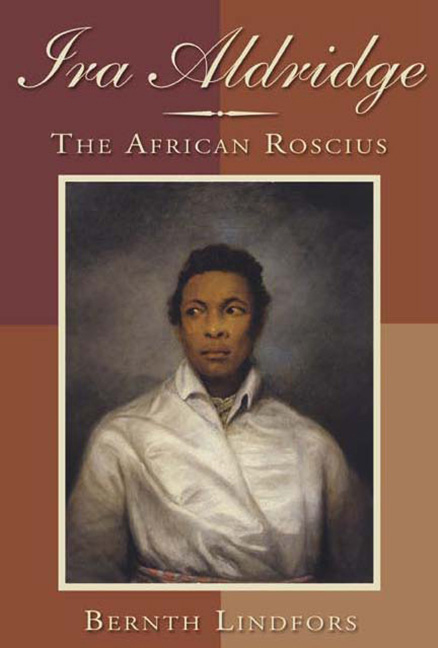Book contents
- Frontmatter
- Miscellaneous Frontmatter
- Contents
- List of Illustrations
- Acknowledgments
- Introduction
- Part One: The Life
- Part Two: The Career
- 8 Ira Aldridge's Fight for Equality
- 9 Ira Aldridge in Manchester
- 10 Acting Black: Othello, Othello Burlesques, and the Performance of Blackness
- 11 Ira Aldridge: Shakespeare and Minstrelsy
- 12 “Mislike me not for my complexion … “: Ira Aldridge in Whiteface
- 13 Ira Aldridge as Macbeth and King Lear
- 14 Creating the Black Hero: Ira Aldridge's The Black Doctor
- 15 The First American on the Zagreb Stage
- 16 A Heartwarming, Radiant Othello in the Netherlands, 1855
- 17 Ira Aldridge's Performances in Meiningen
- 18 “Othello's Occupation's Gone!” The African Roscius in Poland, 1853–67
- Notes on Contributors
- Index
- Miscellaneous Endmatter
12 - “Mislike me not for my complexion … “: Ira Aldridge in Whiteface
from Part Two: The Career
Published online by Cambridge University Press: 26 October 2017
- Frontmatter
- Miscellaneous Frontmatter
- Contents
- List of Illustrations
- Acknowledgments
- Introduction
- Part One: The Life
- Part Two: The Career
- 8 Ira Aldridge's Fight for Equality
- 9 Ira Aldridge in Manchester
- 10 Acting Black: Othello, Othello Burlesques, and the Performance of Blackness
- 11 Ira Aldridge: Shakespeare and Minstrelsy
- 12 “Mislike me not for my complexion … “: Ira Aldridge in Whiteface
- 13 Ira Aldridge as Macbeth and King Lear
- 14 Creating the Black Hero: Ira Aldridge's The Black Doctor
- 15 The First American on the Zagreb Stage
- 16 A Heartwarming, Radiant Othello in the Netherlands, 1855
- 17 Ira Aldridge's Performances in Meiningen
- 18 “Othello's Occupation's Gone!” The African Roscius in Poland, 1853–67
- Notes on Contributors
- Index
- Miscellaneous Endmatter
Summary
Ira Aldridge, the first important black American Shakespearean actor, had an odd but remarkable theatrical career. Born in New York City in 1807, educated for a few years in the second African Free School in lower Manhattan, employed in his youth at various menial jobs in the city, including a brief stint as a costume carrier for a visiting British actor, and then involved in several small dramatic productions put on by ragtag black acting companies at a short-lived establishment called the African Theatre, he fell in love with the stage and aspired to become a professional actor. Since he could not fulfill this ambition in the United States, which had proven “not yet ready to accept black actors in the legitimate drama,” he emigrated to the British Isles, where he was fortunate enough to secure his first engagement with top billing at London's Royalty Theatre in May 1825 when he was only seventeen years old.
In those days it was customary to hail a talented young performer as a “Roscius,” a name alluding to the great Roman actor Quintus Roscius Gallus. Garrick had been the first “English Roscius.” Next came Mr. Betty, the phenomenally successful juvenile thespian who was heralded as the “Young Roscius,” and thereafter the name was linked to theatrical precocity. Master Grossmith, a sevenyear- old, was introduced on the stage as the “Celebrated Infant Roscius,” and Miss Lee Sugg, another child prodigy, as the “Young Roscia.” Inevitably, Scottish, Irish, Welsh, and several American Roscii and Rosciae, including a Kentucky Roscius, soon appeared. Since Aldridge was both young and black, he was quickly dubbed the “African Roscius,” an honorific title given extra resonance when theater managers began to spread the word that he was the son of a Christian Fulah (Fulani) prince from Senegal. Aldridge, whose staple role was Shakespeare's Othello, could be said to have made a career out of playing a Moor playing a Moor. This may have been an adroit theatrical strategy, given the obstacles a black neophyte would have had to overcome to be accepted as a legitimate player on a foreign stage.
- Type
- Chapter
- Information
- Ira AldridgeThe African Roscius, pp. 180 - 190Publisher: Boydell & BrewerPrint publication year: 2007

